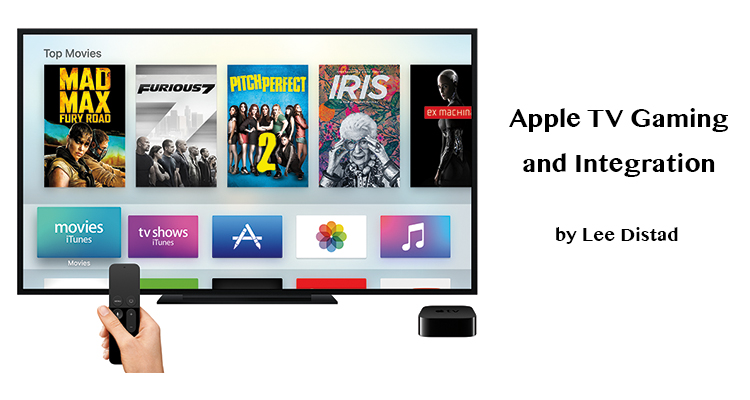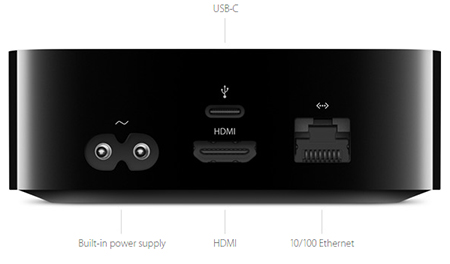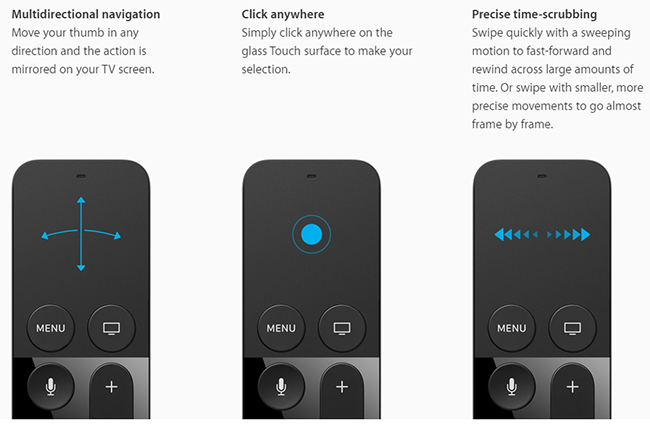Apple TV Gaming and Integration

This month Apple lifted the curtain on its new Apple TV, dubbed, oddly enough, The New Apple TV.
Since then, many of us in the AV business and media have spent time parsing the specifications, guessing at the hints Apple has dropped about its capabilities, and pondering the implications it’s going to have on living rooms, ours and our clients.
My focus here is going to be on what I think is the most important opportunity it presents — big-screen gaming — although in order to get to that, I need to first address the new Apple TV from an integration perspective. After all, in order for clients to use it you, the AV pro have to be able to control it.
 The initial take from AV pros I’ve spoken with has been that the new iteration of Apple TV is more-of-the-same. To wit: Apple playing games with their API and making it hard on integrators and third-party control vendors to do anything other than one-way IR.
The initial take from AV pros I’ve spoken with has been that the new iteration of Apple TV is more-of-the-same. To wit: Apple playing games with their API and making it hard on integrators and third-party control vendors to do anything other than one-way IR.
Since the inception of Apple TV, Apple has a history of incorporating propriety layers in its API that make it unfriendly to third-party IP-enabled control. Even as far back as 2010, enterprising third-party vendors made IP-control of Apple TV work, only to have their modules stop working with new iterations of the Apple TV. In 2014, RTI was able to attain full IP control of Apple TV, but AV pros’ expectations are that, if history is any guide, RTI’s API won’t work and they and other third-party control vendors will have to go back to the drawing board.
On top of that, the remote for the new AppleTV is Bluetooth. That means there’s a pretty good chance that your control vendor doesn’t have a Bluetooth module in its catalog that will allow you to use Bluetooth to control the Apple TV.

On top of that, Apple has made its remote effectively mandatory, by including touch controls, a swipe experience, and a built in mic for SIRI voice commands to the user interface. That’s something none of your fancy all-in-one commander remote controls from your control vendor can do. That means two remote controls on your client’s coffee table. I know. I’m horrified at the thought too.
And because the range of Bluetooth is limited, that means you can’t hide the new Apple TV in the rack room either. It’s going to have to be installed in-room.
Now, I have some confidence that third-party will come to the rescue. This isn’t my first rodeo, and I remember the fuss when Sony’s PlayStation 3 debuted, with a TV remote that operated on Bluetooth. AV Pros were up in arms, but third-party vendors stepped up. I still have a Bluetooth/IR conversion dongle that Audio Authority made for the PlayStation 3’s remote control sitting in my gear closet. If IP control isn’t feasible, at least short term, I hope that a Bluetooth-to-RS232 dongle isn’t too much to ask for.
 That said, the primary reason that the Apple TV remote is effectively mandatory is because of its use as a gaming controller. And here we get to the heart of it: With Apple TV, Apple is clearly firing a shot across console gaming’s bow. I think they have a clear picture of where they’re taking this. Add to the fact that Apple has confirmed that its extended the MFi (Made for Apple third party program) to including gaming controllers.
That said, the primary reason that the Apple TV remote is effectively mandatory is because of its use as a gaming controller. And here we get to the heart of it: With Apple TV, Apple is clearly firing a shot across console gaming’s bow. I think they have a clear picture of where they’re taking this. Add to the fact that Apple has confirmed that its extended the MFi (Made for Apple third party program) to including gaming controllers.
What we’re facing is a box (and there are so, so many boxes to choose from now) in the living room that promises to bring the explosion in mobile gaming that the iPhone and iPad generated, only now streamed to the living room, in direct challenge to the incumbent console makers. Now, those hard-copy disc-fed consoles have evolved to include streamed gaming content. But the question is, will the App Store gaming experience blow past them? I wouldn’t bet against it.
I would also caution naysayers who point to the relative weakness of its hardware specs and hard drive size compared to consoles. Another history lesson: Despite being “puny” by console specifications standards the Nintendo Wii enjoyed phenomenal success when it launched. Despite not being as powerful as an Xbox or PlayStation, it still carved out an empire for itself beside its rivals.
Apple TV doesn’t need to clobber Xbox One and Playstation 4 in order to dominate as a gaming platform. What it needs is eager app developers to create games that play to its strengths, specifically its user interface, that will make both serious and casual gamers want one in their living room. Apple has already announced a strong marquee lineup of games and developers for Apple TV gaming; it’s not a huge leap to expect some breakout titles to rocket the new Apple TV to “must have” status.
If anything, Nintendo should be worried. In my opinion, it’s time for Nintendo to do what it should have already done: Give up on propriety hardware and license its Intellectual Property to other platforms like Apple TV.
But that’s mostly just because I want to play Mario Kart on Apple TV.





